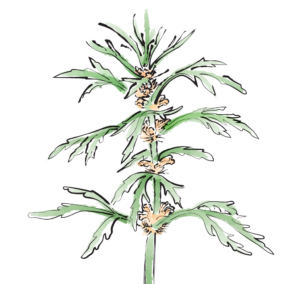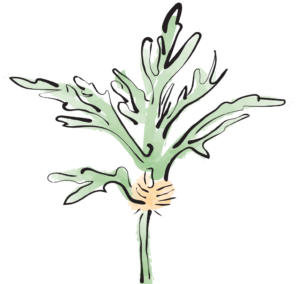Ai Ye
English Name: artemisia argyi, Chinese mugwort
Pharmaceutical Name: Folium Artemisiae Argyi
Medica Category: Stop-Bleeding Herbs
Properties: Ai Ye enters the Spleen, Liver, and Kidney channels; it is bitter and acrid in nature and warm in temperature.

What is Ai Ye?
The Chinese Herb Ai Ye is the leaves of Artemisia Argyi (or Chinese Mugwort), which is a plant in the family of mugworts that grows throughout East Asia. The leaves are covered in oil-producing glands, and it is this oil that gives this herb its characteristic healing actions (discussed in the section below).
Ai Ye can be processed to be used as medicine in a variety of ways; first, it can be decocted for use internally; and depending on what it will be used for, it can be vinegar-fried, charred, or left unprocessed before decocting. It is also the main ingredient that makes up moxa sticks, can be made into an essential oil, or used topically as an herb wash. Quite versatile!
It should also be mentioned that there are safety considerations with use of this herb—see safety notes below.

Traditional Chinese Medicine (TCM) Therapeutic Actions of Ai Ye
Ai Ye warms the channels and stops bleeding. It is commonly used in this regard to address gynecological bleeding caused by deficiency and cold in the uterus.
It is especially helpful to address spotting as well as other clinical presentations such as profuse menstrual bleeding and vaginal bleeding during an unstable pregnancy.
Ai Ye dispels cold and relieves pain that presents as lower abdominal coldness and pain, dysregulated menses, infertility, and profuse clear vaginal discharge.
Burned as moxa, Ai Ye activates qi and blood circulation and warms the channels and peripherals.
Used as a topical wash, Ai Ye treats various dermatological conditions such as eczema and itchy rashes.
As an essential oil, Ai Ye addresses cough and wheezing with phlegm.
–safety notes:
Proper dosage must be adhered to or adverse reactions can occur. In an herbal decoction, proper dosage is 3-10g. Ingested orally as an essential oil, the proper dosage is 0.1 ml of per dose, 3x/day.
As an herbal wash, Chen and Chen notes that some localized redness and warmth may occur.
Adverse reactions may be noticed at doses of 20-30g., and fatality may occur at doses starting at 100g. Acute reactions include (but are not limited to): dry mouth, nausea, and dizziness followed by severe abdominal cramping, diarrhea, spasms/convulsions, and altered consciousness.
Furthermore, long-term use of Ai Ye at large dosages can produce adverse reactions as well. Therefore, we highly recommend consultation with a trained TCM practitioner when using this herb as medicine (especially when ingesting it in any form).
A full discussion of adverse effects and treatment of overdosage of Ai Ye can be found in Chen and Chen, pp. 600-1.
